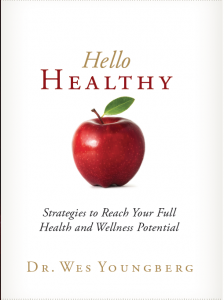The book based on the video series “12 Weeks to Wellness & Optimal Health” is now here.
As I work with clients in my office, by phone, or by Skype, and as I speak at health seminars or medical conferences, people often ask, “Of all the health strategies we’ve been discussing and learning about—which is the most important?”
Hello Healthy is a book about helping you get the synergy effect by applying all the strategies necessary to reach your full health and wellness potential. The twelve chapters of this book are a series of twelve sessions in a practical program that you can follow as you go about your daily routine. These are twelve major strategies that I specifically address with each patient, regardless of their health concerns or wellness goals. They provide the foundation that each of us can use to master our genetic risk by actually turning off disease- causing genes and turning on the genes that promote health.
As you come to better understand the principles we’ll be discussing—and incorporate them as part of your new lifestyle—you’ll be able to enjoy a higher level of health and wellness than you’ve ever thought possible.
Hello Healthy is how friends and family may soon be addressing you!
— Wes Youngberg, DrPH, MPH, CNS, FACLM
Lifestyle Medicine Specialist & Clinical Nutritionist
There is no better description of this book than what others have said about “Hello Healthy”
“What you hold in your hand is nothing short of a health education masterpiece. In it Wes Youngberg weaves a tapestry of anecdotes that provide a powerful and compelling case for health-behavior change and adoption of a healthy lifestyle. Wes provides a detailed rationale and very practical cutting-edge health advice that, if followed, will produce in the reader a reasonable approach to life transformation. His easy going writing style is “smooth” yet so filled with up-to-date health counsel that it cannot be classified as casual reading. Anyone can make improvements following his modern rendition of age-old principles that we use in our own Lifestyle Medicine practice at Wildwood. This is must reading for the sick and required reading for the well!”
–Zeno L. Charles-Marcel, MD
Vice President for Medical Affairs.
Wildwood Lifestyle Center and Hospital
“Once again, Wes Youngberg shares health strategies that transcend the usual medical dialogue. By giving each of us information that we can use personally, he has empowered health behaviors that can impact our enjoyment of life, our productivity, and our longevity. With a practitioner’s understanding of the difficulty of change, Wes gently encourages each of us to seek the best for ourselves.”
–Richard Hart, MD, DrPH
President, Loma Linda University Health
“With U.S. healthcare spending having just crossed the $3 trillion dollar line, Dr. Wes Youngberg’s book couldn’t have come at a more crucial time. The topics covered in his book are the ones patients have been asking me for the past two decades when I worked at a medical group. Now that I’m back in an academic center, these are the very topics we are researching and teaching our public health graduate students, because these are the challenges they’ll face when they get out into the real wold. If you don’t have time for grad school, but care about your health and lifestyle medicine, this book will save you a lot of time, money, and improve the health and quality of life for you and your family.”
–Ernie Medina, Jr., DrPH, CHFS
Assistant Professor-Preventative Care; Executive Director
Center for Nutrition, Healthy Lifestyle & Disease Prevention
Loma Linda University School of Public Health
“Dr. Youngberg does it again! He uses the latest research and real patient stories to teach us how we as individuals and as a society can transform our health. He shows that those with disease can still achieve optimal wellness. Following his plan form the beginning could help save our troubled Healthcare system by preventing disease from even starting. This book is for anyone wanting to live a long, prosperous healthy life.”
–Eric Madrid, MD, ABIHM
Rancho Family Medical Group, Temecula California
Author of “Vitamin D Prescription,
The Healing Power of the Sun and
how it can save your life
“Heart disease has been the leading killer of Americans for the past 100 years and despite advances in medical therapy it shows no sign of relenting. It is clear that Americans are bringing this on themselves by the lifestyle choices they make. As a Cardiologist I see the effects of smoking and poor diet and sedentary lifestyle affecting younger and younger patients. It doesn’t have to be this way. Nearly 90% of Heart disease and other lifestyle diseases could be prevented by the principles articulated so well in Dr. Youngberg’s book. The principles of a healthy lifestyle are laid out in an easy to understand approach, along with compelling stories of real people who have made changes in their lifestyle and benefited from a more abundant life as a result. I highly recommend this book to anyone who desires to live a healthier and fulfilling life, free of lifestyle diseases.”
–Brian Schwartz, MD
Director, Interventional Cardiology Fellowship Program
Kettering Medical Center, Dayton, Ohio.
“Poor health is the modern world’s ‘plague,’ literally destroying mankind’s potential to live a productive, satisfying life. This book explains in simple, practical terms how to reverse that plague and achieve optimal health. Read it. Live it. Share it. It just might be the best thing you’ll ever do.”
–John Kelly, MD, MPH, Founding President American College of Lifestyle Medicine.

